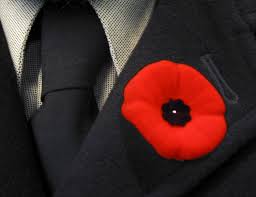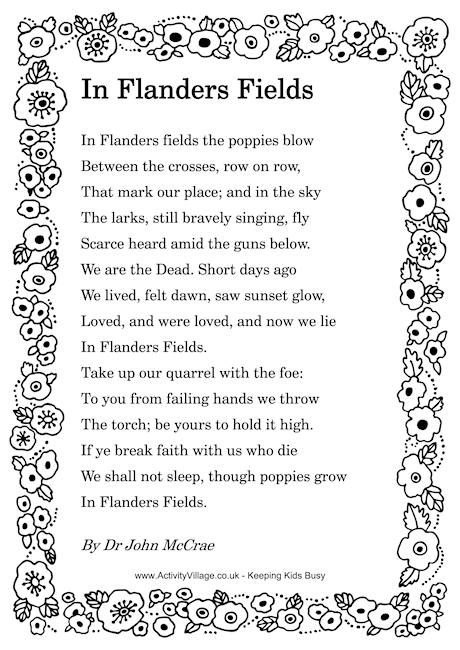The armistice that ended battlefield hostilities during World War I started at the eleventh hour, on the eleventh day, of the eleventh month in 1918. Here in Canada wearing a Red Poppy on the left lapel, the one closest to the heart, is a tradition we use to mark this event.
Though now a full century after the beginning of the Great War, government and financial institutions are the only ones to actually take the day off, November 11th is still a National Holiday here called Remembrance Day.
In the United States November 11th is also celebrated as Veteran’s Day.
Now you can talk to me about the pointlessness of war. How violence is not the answer. Or how it is wrong for well-off, well-fed, middle-aged (mostly) white men to send our youth off to fight their battles for them; and on 364 days of the year I’ll probably agree with a lot of what you have to say.
But just not today, alright? Today, November 11th we pay our respects to those who served in all wars, and especially to those who were lost, at home and abroad.
Speaking to younger people it saddens me to find that so few know how this tradition started.
It’s a fascinating story that stems from one of the most iconic pieces of Canadian literature ever written. I don’t know if they still teach it in schools today but the poem In Flanders Fields by Lieutenant Colonel John McCrae was taught to every child of my generation. We memorized and recited it every year in grade school.
In fact this poem is such an ingrained part of Canadian heritage that until 2013 when we switched to polymer money, an excerpt from the poem was included on the back of our ten dollar bill.
McCrae who was born in Guelph Ontario, was a 41-year-old doctor serving with the Canadian artillary during the second battle of Ypres, in the Flanders region of Belgium.
On May 2nd, 1915 during a particularly brutal offensive by the Germans, McCrae witnessed the death of Alexis Helmer, a 22-year-old friend and former student of his from his teaching days at McGill University in Montreal.
Legend has it that during a short break in the hellish battle, McCrae and Helmer were having a smoke away from the trenches. Helmer was exhuberently telling McCrae about his plans for after the war, and how he hoped to marry his sweetheart when he got back home.
A few minutes later as they tossed aside their cigarette butts and went their seperate ways back to their posts, McCrae heard that unmistakable whistling sound of an incoming mortar shell. The nearby explosion rocked him and he turned to see if Helmer was alright, only to discover that the young man had sustained a direct hit; his body was blown to pieces.
The following day after presiding over his friend’s funeral and burying what remains could be collected, McCrae took a solitary stroll to a remote corner of their makeshift cemetary. Alone with his thoughts as he looked out over a field of poppies that swayed in the breeze, he was seen scribbling intently in his notepad.
This is what he wrote:
Apparently McCrae was not happy with the poem, or perhaps it was just the sense of overwhelming futility of it all. Whatever the reason, he tore the page out of his notebook, crumpled it up and discarded it. It was picked up by someone who had been watching him and forwarded on to a military journal where it was published. It gradually gained in popularity and became one of the most famous war poems of all time.
Though John McCrae didn’t make it home from the war either, his words live on. Through his poem poppies became a symbol that is still used to this day as a way to remember and pay tribute to those who served and sacrificed in that and all subsequent wars.
Here in Canada the yearly Poppy Campaign is organized by the Royal Canadian Legion. In late October veterans don their uniforms and fan out across the country in shopping malls and other places where people go in large numbers. They stand quietly with their boxes of poppies and tin can to collect donations. The money raised is used to help provide anything not covered by government-funded veteran’s services and to offer additional assistance to the families of those who have fallen.
There is no specific price. For each Poppy you take you can give as much or as little as you can afford. But if you can and haven’t done so yet please take a poppy and give back a little something to those who have given so much.
And if your budget doesn’t allow for it or you simply don’t want to wear a poppy then I offer this advice; if you cross paths with a veteran this week take a moment out of your busy day to offer a simple handshake and a heartfelt, “Thank you for your service.”
We may not always agree with the reasons why we go to war, but those who serve their country and willingly put themselves in harms way for us deserve our respect, our appreciation, and on at least one day a year a little recognition for their dedication.






Well said, sir.
LikeLike
So very well expressed, Norm. This is a special day I hope the world never forgets to commemorate.
LikeLiked by 1 person
Thanks 🙂
LikeLike
Thank you for the information on the Doctor and is poetry. Shared this blog post today. Here in the US, there are different Vet groups that collect and give out poppies too.
LikeLiked by 1 person
Thanks so much for sharing it 🙂
LikeLike
Pingback: Never Forget – Why We Wear the Poppy | stitchinggrandma
So important to remind everyone, thanks for sharing this Norm.
LikeLiked by 1 person
Thank you!
LikeLiked by 1 person
When you are fortunate enough to write a post that is perfect for the occasion, then run it every year because it is well worth rereading.
LikeLiked by 1 person
Thank you!
LikeLike
Reblogged this on Norm 2.0 and commented:
Depending on when you started following, this post may be new to you, or you may remember it from last year. In either case, since I cannot express my feelings about this day any better than I did last year, I decided not to try. Please have a look:
LikeLike
I read this for the first time today. The most heartbreaking illustration of the loss of life, brimgs tears to my eyes again, the photos of the Tower of London last year. Cascades of poppies. One for each life lost.
LikeLiked by 1 person
We Aussies also call it Remembrance Day, and your words were beautiful, my Grandfather, Uncle and Father all served in WW2.. And though no longer with us, never forgotten.
Kim in Australia
LikeLiked by 1 person
Thank you so much Kim and welcome.
I poked around on your blog a little as well, you too have a new follower 🙂
LikeLiked by 1 person
Thank-you Norm, always welcome to poke around, new followers are always welcome, I hope you find something to enjoy reading about.
LikeLiked by 1 person
Beautiful post! My dad was a WWI volunteer. Cheers, 🙂 Irina
LikeLiked by 1 person
Sorry for the delay in responding, it has been a hectic week. Thanks so much for stopping by and for the kind words 🙂
LikeLiked by 1 person
A wonderful tribute to those who have died. We will never forget their sacrifice…
LikeLiked by 1 person
That’s certainly the idea. Thanks so much for the kind words 🙂
LikeLiked by 1 person
Thank you for this beautiful post, Norm.
LikeLiked by 1 person
And thank you for the kind words Nancy.
If you get a chance check out some of the profiles on Lisa’s blog as well 🙂
LikeLike
I will.
LikeLiked by 1 person
Hey Nancy, thanks for sharing that link to my post in the comments on The Bloggess earlier. It generated quite a few visits for me today. Next time you’re in Montréal I owe you a coffee 🙂
LikeLike
How awesome! The Bloggess is a legend, so I’m not surprised it generated some good traffic!
I’m actually in Montreal on Thursday- but it’s just a quick day trip. I’m pretty sure my Montreal rep has me slammed in meetings with his clients all day. Next time, coffee for sure!
LikeLiked by 1 person
Heartfelt post on this very special day of remembrance, and I thank you.
LikeLiked by 1 person
You’re very welcome Judy, and I thank you too. Have a good Veteran’s Day 🙂
LikeLike
Great post, Norm! I was aware of the poem… My dad used to say bits and pieces of it when we’d be on the subject, but had no idea people wore poppies in Canada for remembrance today. I think that is awesome!
LikeLiked by 1 person
Thanks Hollie. If you get a chance, read some of Lisa’s veteran’s features this week. Their stories deserve to be heard. 🙂
LikeLike
I will for certain!!
LikeLiked by 1 person